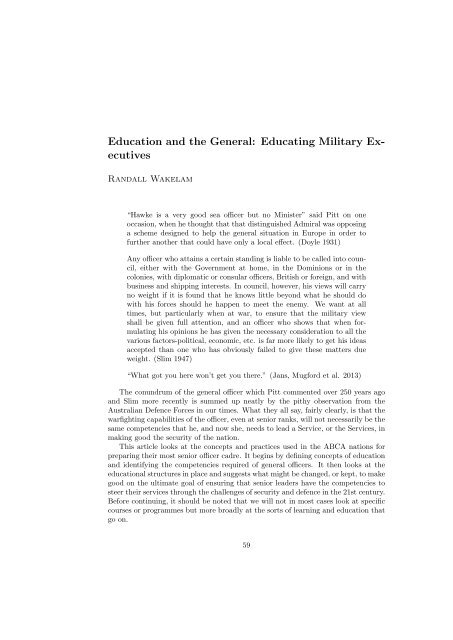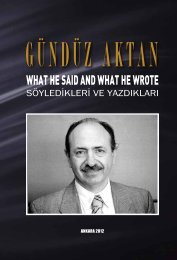The New Strategist Journal
newstrat-wakelam
newstrat-wakelam
You also want an ePaper? Increase the reach of your titles
YUMPU automatically turns print PDFs into web optimized ePapers that Google loves.
Education and the General: Educating Military Executives<br />
Randall Wakelam<br />
“Hawke is a very good sea o cer but no Minister” said Pitt on one<br />
occasion, when he thought that that distinguished Admiral was opposing<br />
a scheme designed to help the general situation in Europe in order to<br />
further another that could have only a local e↵ect. (Doyle 1931)<br />
Any o cer who attains a certain standing is liable to be called into council,<br />
either with the Government at home, in the Dominions or in the<br />
colonies, with diplomatic or consular o cers, British or foreign, and with<br />
business and shipping interests. In council, however, his views will carry<br />
no weight if it is found that he knows little beyond what he should do<br />
with his forces should he happen to meet the enemy. We want at all<br />
times, but particularly when at war, to ensure that the military view<br />
shall be given full attention, and an o cer who shows that when formulating<br />
his opinions he has given the necessary consideration to all the<br />
various factors-political, economic, etc. is far more likely to get his ideas<br />
accepted than one who has obviously failed to give these matters due<br />
weight. (Slim 1947)<br />
“What got you here won’t get you there.” (Jans, Mugford et al. 2013)<br />
<strong>The</strong> conundrum of the general o cer which Pitt commented over 250 years ago<br />
and Slim more recently is summed up neatly by the pithy observation from the<br />
Australian Defence Forces in our times. What they all say, fairly clearly, is that the<br />
warfighting capabilities of the o cer, even at senior ranks, will not necessarily be the<br />
same competencies that he, and now she, needs to lead a Service, or the Services, in<br />
making good the security of the nation.<br />
This article looks at the concepts and practices used in the ABCA nations for<br />
preparing their most senior o cer cadre. It begins by defining concepts of education<br />
and identifying the competencies required of general o cers. It then looks at the<br />
educational structures in place and suggests what might be changed, or kept, to make<br />
good on the ultimate goal of ensuring that senior leaders have the competencies to<br />
steer their services through the challenges of security and defence in the 21st century.<br />
Before continuing, it should be noted that we will not in most cases look at specific<br />
courses or programmes but more broadly at the sorts of learning and education that<br />
go on.<br />
59



